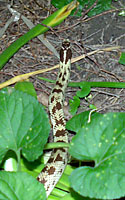Terry L. Ettinger Horticulture Consulting Services
Meeting The Needs Of Today With A Vision For The Future
Question of the Week
Snakes in the Garden
 Q. My boyfriend isn't a gardener, but he's very supportive of my passion for this wonderful hobby and has always
been more than willing to do any "heavy lifting" that needs to be done in our garden. However, last week he picked up a rock
for a waterfall that we're building and found a snake underneath of it. I'm not sure who went faster in opposite directions -
my boyfriend or the snake! Anyway, progress has now stalled on the waterfall, as he won't go near the rock pile. Can you put
in writing that the little green snakes we find in our gardens can't hurt people so that I can nudge him back to work?
Q. My boyfriend isn't a gardener, but he's very supportive of my passion for this wonderful hobby and has always
been more than willing to do any "heavy lifting" that needs to be done in our garden. However, last week he picked up a rock
for a waterfall that we're building and found a snake underneath of it. I'm not sure who went faster in opposite directions -
my boyfriend or the snake! Anyway, progress has now stalled on the waterfall, as he won't go near the rock pile. Can you put
in writing that the little green snakes we find in our gardens can't hurt people so that I can nudge him back to work?
A. After receiving your question/request, I typed the phrase "fear of snakes" into my favorite search engine. I discovered that the fear of snakes, or "ophidiophobia," may be "hardwired" by the evolutionary process into many of us? Of course, our comfort level around snakes and other creatures is likely also a product of our experiences during early childhood.
With this in mind, I can rationalize that all snakes play a beneficial role in the web of life and therefore never harm those I come across in my gardening pursuits. At the same time, it would take a rather large sum of money to convince me to actually hold one. In fact, I have to admit that on more than one occasion I've beat a rather hasty retreat after confronting even baby garter snakes during my gardening pursuits in order to collect myself before heading back for a closer look!
The best way to reduce the chance of future snake/boyfriend confrontations is to remove or alter the features of your landscape that provide cover and protection to snakes. For example, cut down tall grasses and weeds, prune shrubs to open their canopy, and remove open sources of water, groundcover plantings, compost bins and piles of rocks, lumber, brush and mulch.
In other words, you'll want to create a "biological desert" consisting of nothing more than a couple of trees and property line-to-property line lawn - or pavement!
Just in case the above option isn't really an option, I suggest being patient with your boyfriend and offer to share, side-by-side, the heavy lifting in your garden for a while. Chances are that over time he'll develop at least a cautious curiosity about this fascinating group of reptiles.